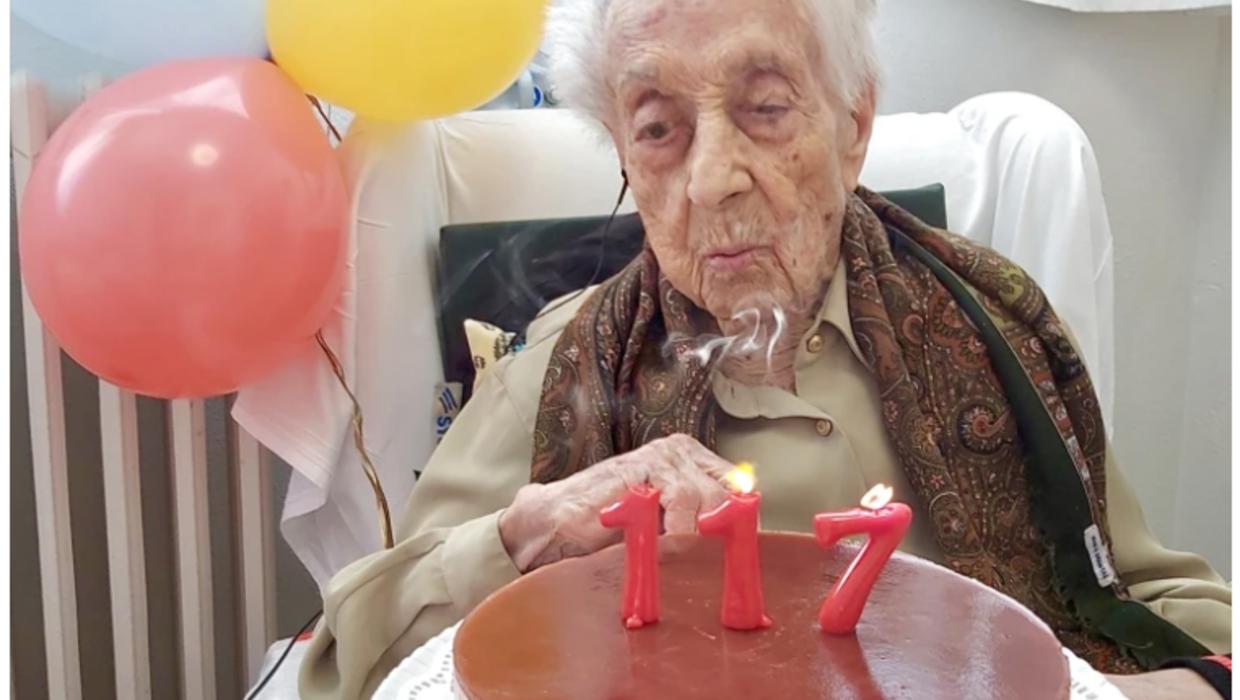Science
Researchers Uncover Secrets to Longevity from World’s Oldest Woman

A recent study has shed light on what contributes to exceptional longevity, using insights from the life of Maria Branyas Morera, who is recognized as the world’s oldest living woman at 117 years. Conducted by a team from the University of Barcelona, the research emphasizes factors that may help individuals lead longer and healthier lives.
The study highlights several key elements that have characterized Branyas Morera’s long life. Born in the United States in 1907, she moved to Spain as a child and has lived through significant historical events, including two World Wars and the Spanish Civil War. Her personal narrative provides a unique perspective on resilience and adaptability, traits that researchers believe contribute to her longevity.
One of the primary findings of the research is the importance of maintaining strong social connections. Branyas Morera has a close-knit family, which has provided her with emotional support throughout her life. Experts suggest that such relationships can significantly impact mental health, thereby influencing overall longevity.
Health and Lifestyle Factors
In addition to social connections, the study examines lifestyle habits that could play a role in extending lifespan. Branyas Morera reportedly maintains a balanced diet, rich in fruits and vegetables, and has a positive outlook on life. The researchers emphasize that physical activity, even in moderate forms, is crucial for maintaining health as one ages.
The concept of “healthspan,” which refers to the period of life spent in good health, rather than just extending lifespan, is a focal point of the study. Researchers argue that achieving a longer healthspan could lead to improvements in quality of life for older adults. Branyas Morera’s lifestyle exemplifies this concept, as her mental acuity and active engagement with her family are notable even at her advanced age.
The findings align with broader gerontological research that stresses the interplay of genetics, environment, and personal choices in determining longevity. According to the study, while genetics can influence lifespan, environmental factors, including lifestyle choices and social interactions, are equally significant.
Implications for Future Research
As the global population ages, understanding the factors contributing to a long and fulfilling life is increasingly relevant. The insights gleaned from Maria Branyas Morera’s life could inform future research in gerontology and public health policies aimed at improving the well-being of older adults.
The researchers encourage further studies to explore the relationships between social connections, lifestyle habits, and longevity. By focusing on these areas, there may be potential to develop interventions that promote healthier aging.
In conclusion, the life of Maria Branyas Morera serves as a remarkable case study, illustrating the multifaceted nature of longevity. Her experiences and the research findings provide valuable lessons for individuals and health professionals alike, reinforcing the idea that a fulfilling life can indeed contribute to a longer one. As the quest for understanding aging continues, the focus remains not only on how long we live, but also on how well we live.
-

 World3 months ago
World3 months agoTest Your Knowledge: Take the Herald’s Afternoon Quiz Today
-

 Sports3 months ago
Sports3 months agoPM Faces Backlash from Fans During Netball Trophy Ceremony
-

 Lifestyle3 months ago
Lifestyle3 months agoDunedin Designers Win Top Award at Hokonui Fashion Event
-

 Sports3 months ago
Sports3 months agoLiam Lawson Launches New Era for Racing Bulls with Strong Start
-

 Lifestyle3 months ago
Lifestyle3 months agoDisney Fan Reveals Dress Code Tips for Park Visitors
-

 Health3 months ago
Health3 months agoWalking Faster Offers Major Health Benefits for Older Adults
-

 World3 months ago
World3 months agoCoalition Forms to Preserve Māori Wards in Hawke’s Bay
-

 Politics3 months ago
Politics3 months agoScots Rally with Humor and Music to Protest Trump’s Visit
-

 Top Stories3 months ago
Top Stories3 months agoUK and India Finalize Trade Deal to Boost Economic Ties
-

 World3 months ago
World3 months agoHuntly Begins Water Pipe Flushing to Resolve Brown Water Issue
-

 Entertainment3 months ago
Entertainment3 months agoExperience the Excitement of ‘Chief of War’ in Oʻahu
-

 Science3 months ago
Science3 months agoNew Interactive Map Reveals Wairarapa Valley’s Geological Secrets









